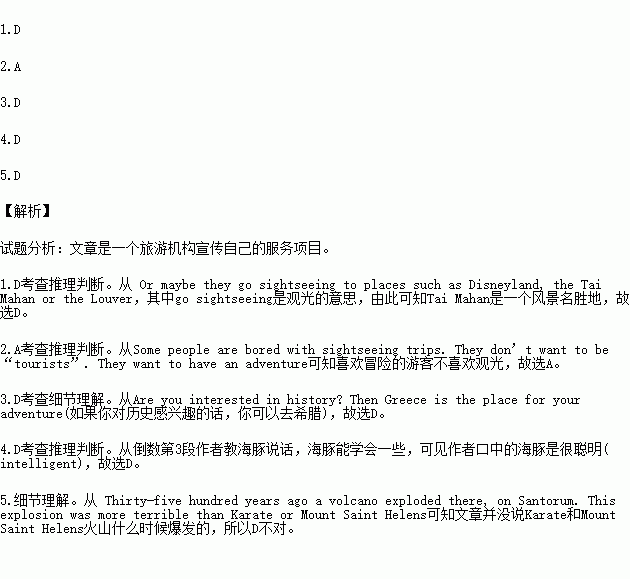题目内容
People like different kinds of vacations. Some go camping. They swim, fish, cook over a fire and sleep outside. Others like to stay at a hotel in an exciting city. They go shopping all day and go dancing all night. Or maybe they go sightseeing to places such as Disneyland, the Tai Mahal or the Louvre.
Some people are bored with sightseeing trips. They don’t want to be “tourists”. They want to have an adventure— a surprising and exciting trip. They want to learn something and maybe help people too. How can they do this? Some travel companies and environmental groups are planning special adventures. Sometimes these trips are difficult and full of the world. Some volunteers spend two weeks and study the environment. Others work with animals. Others learn about people of the past.
Would you like an adventure in the Far North? A team of volunteers is leaving from Murmansk, Russia. The leader of this trip is a professor from Alaska. He’s worried about chemicals from factories. He and the volunteers will study this pollution in the environment. If you like exercise and cold weather, this is a good trip for you. Volunteers need ski sixteen kilometers every day. -
Do you enjoy ocean animals? You can spend two to four weeks in Hawaii. There, you can teach language to dolphins. Dolphins can follow orders such as “Bring me the large ball”. They also understand opposites. How much more can they understand? It will be exciting to learn about these intelligent animals. Another study trip goes to Washington State and follows orcas. We call orcas “Killer Whale”, but they’ re really dolphins—the largest kind of dolphin.. These beautiful animals travel together in family groups. They move through the ocean with their mothers, grandmothers and great-grandmothers. Ocean pollution is chasing their lives. Earthwatch is studying how this happens.
Are you interested in history? Then Greece is the place for your adventure. Thirty-five hundred years ago a volcano exploded there, on Santorini. This explosion was more terrible than Krakatoa or Mount Saint Helens. But today we know a lot about the way of life of the people from that time. There are houses, kitchens, and paintings as interesting as those in Pompei. Today teams of volunteers are learning more about people from the past.
Do you want a very different vacation? Do you want to travel far, work hard and learn a lot? Then an Earthwatch vacation is for you.
1.The Tai Mabal may be _________.
A. a shopping center B. a hotel
C. a dancing ball D. a place of interest
2.From the passage, on an adventure trip, people ______________.
A. may not spend much time on sightseeing
B. won’ t meet some difficulties or hardships
C. can’t enjoy themselves -
D. can’t learn something
3.If you want to learn something about people of the past, you can ___________
A. join the team to Hawaii B. join the team to the Far North
C. join the team to Washington D. join the team to Greece
4.The word “intelligent” in paragraph 4 means __________________.
A. exciting B. beautiful C. large D. clever
5.Which of the following is false ?
A. Some people find sightseeing trips boring.
B. Earth watch is planning all these special adventures
C. The number orcas is decreasing.
D. 3 volcano explosions in all broke out 3, 500 years ago in Greece.

